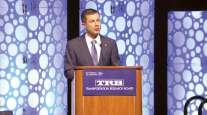Senior Reporter
TRB to Finalize ‘Critical Issues’ Report

[Stay on top of transportation news: Get TTNews in your inbox.]
WASHINGTON — Executives with the Transportation Research Board are readying a guiding document outlining issues deemed critical across modes of transportation, the group’s leadership recently announced during TRB’s annual meeting.
Neil Pedersen, TRB executive director, explained the upcoming “Critical Issues in Transportation” report’s focus will be framed around pressing themes “because transportation is not an end in itself, but rather a means to an end.”
The report, expected to highlight topics of importance and promote areas in need of further scholarship and analyses, is meant to spotlight dominant themes in transportation to equip policymakers with a road map for the coming years.
Want more news? Listen to today's daily briefing above or go here for more info
Specifically, for its upcoming report — a document updated periodically by the group’s executive committee — TRB intends to prioritize matters pertaining to safety and security, public health, the economy, climate change, and sustainability and equity, Pedersen said Jan. 12.
“The critical issues in transportation document is an important part of strategic planning for TRB. It serves to help guide issues that TRB’s programs, activities and committees will focus on for the next five years,” Pedersen said at the annual meeting’s luncheon this month.
Recent “critical issues” in transportation emphasized by TRB’s leadership included:
- Transformational technologies and services
- Population trends
- Energy and sustainability
- Resilience and security
- Safety and public health
- Equity
- Governance
- System performance and asset management
- Funding and finance
- Goods movement
- Institutional and workforce capacity
- Research and innovation.
The most recent version of the report determined, “Transportation plays a central role in society and the economy but is frequently taken for granted. Reflect, though, on how much you depend on reliable and affordable transportation to access work, friends and family, recreation, shopping and worship. Then visualize the transportation networks needed for the daily movement of hundreds of millions of vehicles, ships, planes and trains to satisfy both personal needs and commercial demands. These networks are enormous and complex.”
It continued, “A national conversation among policymakers and citizens about how the country should respond to these challenges is urgently needed. Stakeholders need to debate, discuss and analyze how transportation can evolve to meet growing and evolving needs and adapt to changes in society, technology, the environment and public policy.”
Transportation Secretary Pete Buttigieg offered keynote remarks at the meeting, which had a theme of “Innovating an Equitable, Resilient, Sustainable and Safe Transportation System.”

Buttigieg addresses TRB. (The National Academies of Sciences, Engineering and Medicine via YouTube)
During his address at the TRB meeting on Jan. 12, Buttigieg covered issues related to equity, technology and freight connectivity. He emphasized the department’s aim of pursuing efforts meant to assist the trucking industry with workforce retention and recruitment.
“We’ve got to make sure, not only that we’re recruiting people in the field, but that it is not a leaky bucket. Rather, that we make sure that the working conditions and compensation reflect the fact that those jobs are absolutely essential,” said Buttigieg, pressing for a need to expand a workforce committed to improving the flow of freight at commercial ports.
BUTTIGIEG TALKS TO TT: Sign up for Jan. 19 Newsmakers program
Meanwhile, the annual meeting also featured a panel hosted by Shawn Wilson, secretary of the Louisiana Department of Transportation and Development. The discussion among transportation executives centered around concerns related to equity. Wilson is president of the American Association of State Highway and Transportation Officials, or AASHTO.
“When I became Louisiana’s transportation secretary in 2016, I was the only African-American state DOT secretary,” Wilson said in remarks published by AASHTO. “Now we have the most diverse group of [state DOT] CEOs in terms of gender, race and background than at any time in AASHTO’s history.”




